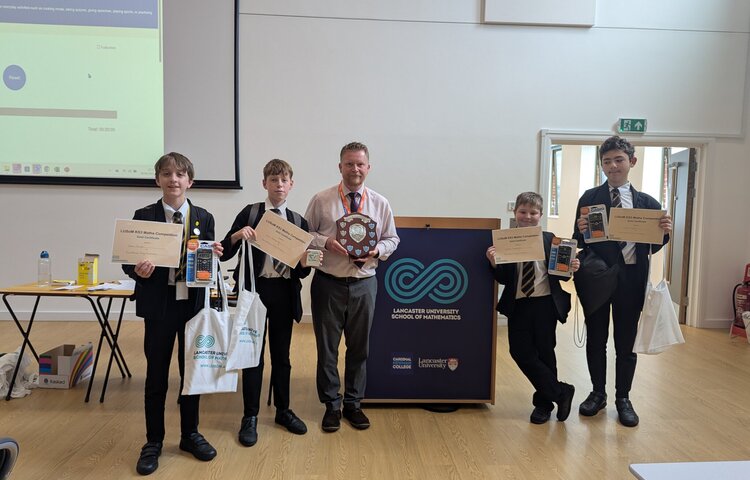Maths
Intent
The mathematics curriculum at Penwortham Priory Academy has been designed to recognise children’s prior learning from each key stage, to build upon this through the application of challenging work which requires pupils to think hard, whilst fostering a classroom environment which allows learners to develop leadership and organisational skills. We provide academic support for each and every child as well as encouraging learners to become increasingly resilient. We do this because we want our pupils to take mathematical risks, to show initiative and to communicate mathematically, in order to best prepare them for the challenges beyond school. High quality academic guidance enables this, and we provide a broad and balanced curriculum that supports pupils’ learning and progression, enabling them to work towards achieving their goals. The curriculum remains as broad as possible for as long as possible. Within the mathematics department we place a high premium on developing the character and culture of pupils to be positive, committed individuals willing to evolve, and show kindness and respect to all.
Knowledge is at the heart of our curriculum and underpins our approach because we are all empowered by knowing things, and by being able to apply what we have learned in varied and new situations. We believe that pupils deserve to know the detail of what they will learn, how this links to the mathematics schema and how this in turn links to other subjects, in order to allow them to have a broader understanding of how the world works. The mathematical knowledge we want pupils to acquire is sequenced and mapped deliberately and coherently and we use strategies such as spaced retrieval practice, low stakes quizzes and plenty of repeated practice for automatic responses and fluency to ensure that concepts are understood, knowledge that has been taught is remembered and it is shown through the skill to apply it to problem solving in and beyond school. We put emphasis on the acquisition and use of a technical vocabulary which enables pupils to communicate mathematically, and facilitate this through teacher talk, concise note taking and applications to real world scenarios.
In addition to the diverse and rich opportunities offered through our teaching, we value opportunities to extend pupils mathematical knowledge via enrichment activities to help them to appreciate mathematics in the wider world.
Teachers of Maths
Mr P Kenrick - Head of Maths
Mr A Sneddon - Assistant Head of Maths
Mr G Evans - Lead Practitioner for Teaching & Learning
Mr A Hunter
Mr T Raynor
Lessons
Year 7 - four hours of Maths per week
Year 8 - four hours of Maths per week
Year 9 - four hours of Maths per week
Year 10 - five hours of Maths per week
Year 11 - four hours of Maths per week
Implementation
Key Stage 3 (years 7,8 & 9) – In Key Stage 2 students work to gain a basic understanding of number, algebra, shape and statistics as outlined in the Key Stage 2 national curriculum. In Key Stage 3 they need to broaden their knowledge within these strands as well as explore aspects of each strand in a greater depth in order to gain a better understanding of the most underpinning topics of mathematics. Throughout the course of Key Stage 3 Mathematics at Penwortham Priory students acquire knowledge, develop fluency and learn to problem solve and reason mathematically in various different topics.
In Year 7, students build upon prior mathematical knowledge in numbers and the number system, algebra, ratio and proportion and geometry. Students develop their reasoning skills through challenging problems written in unfamiliar contexts. Lessons will synthesize core learning with rich mathematical tasks that extend where appropriate.
During Year 8, students build upon knowledge learned at KS2 and Year 7, in numbers and the number system, algebra, ratio and proportion and geometry. Students develop their reasoning skills through challenging problems written in unfamiliar contexts. Lessons will synthesize core learning with rich mathematical tasks that extend where appropriate.
During Year 9, students build upon knowledge learned in previous years, in numbers and the number system, algebra, ratio and proportion, geometry, statistics and probability. Students develop their reasoning skills through challenging problems written in unfamiliar contexts. Students are expected to work increasingly independently demonstrating application on concepts learned.
Key Stage 4
Students at Priory study the OCR GCSE in Mathematics J560 at Higher or Foundation tier.
OCR’s GCSE (9–1) in Mathematics provides a broad, coherent, satisfying and worthwhile course of study. It encourages learners to develop confidence in, and a positive attitude towards mathematics and to recognise the importance of mathematics in their own lives and to society. It also provides a strong mathematical foundation for learners who go on to study mathematics at a higher level, post-16.
It emphasises and encourages:
- Sound understanding of concepts
- Fluency in procedural skill
- Competency to apply mathematical skills in a range of contexts
- Confidence in mathematical problem solving.
More detail can be found in the documents below.
Maths Curriculum
Attainment and Progress (national tests and assessments)
2024 GCSE Maths Outcomes
|
Subject |
9 - 7 % |
9 - 5 % |
9 - 4 % |
|
Mathematics |
15 |
51 | 72 |
Extra curricular clubs
-
Sparx homework club - every Monday after school in IT2. Maths teachers will be on hand to help students complete their weekly Sparx Maths homework
-
Further Maths GCSE sessions - Students in Year 11 have the opportunity to study for an extra GCSE. This is a particularly beneficial GCSE for those intending to study Maths at A-Level
Trips and visits
-
Maths City, Leeds - A number of students enjoyed a visit to Maths City, where they took part in a range of interesting extra-curricular Maths
-
Runshaw Maths Challenge - Runners up in 2023 and champions in 2024, our students strive to be some of the best in the local area
-
LUSoM Maths Challenge - Champions in the inaugural 2023 competition
Guest speakers and workshops
-
GCHQ - Encouraging girls into cyber security session provided a useful insight into how Maths and computing could take students further
Specialist programmes
-
Lancaster University mathematical enrichment course - Offered to students aiming for the highest grades, this course runs on selected Saturday mornings in the Autumn term
Where can studying Maths take you?
Related News
From Primary to Priory: The 2025 Maths Challenge
We welcomed once again some of the brightest young mathematicians in the area for the second annual Priory Maths Challenge.
Calculated Success for Priory at Maths College
Priory pupils celebrated winning a tough maths competition at the Lancashire University School of Maths


